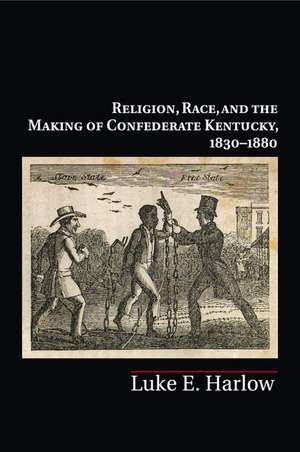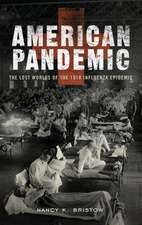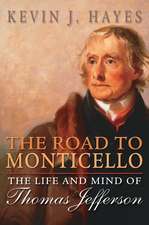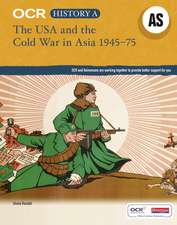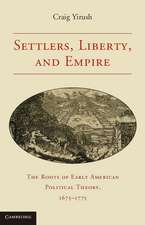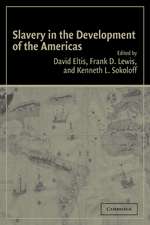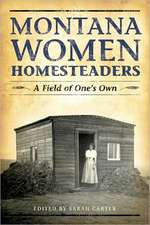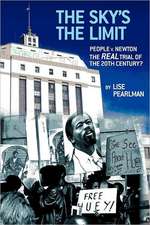Religion, Race, and the Making of Confederate Kentucky, 1830–1880: Cambridge Studies on the American South
Autor Luke E. Harlowen Limba Engleză Paperback – 6 apr 2016
| Toate formatele și edițiile | Preț | Express |
|---|---|---|
| Paperback (1) | 266.98 lei 43-57 zile | |
| Cambridge University Press – 6 apr 2016 | 266.98 lei 43-57 zile | |
| Hardback (1) | 639.24 lei 43-57 zile | |
| Cambridge University Press – 20 apr 2014 | 639.24 lei 43-57 zile |
Din seria Cambridge Studies on the American South
-
 Preț: 238.69 lei
Preț: 238.69 lei -
 Preț: 224.34 lei
Preț: 224.34 lei -
 Preț: 438.44 lei
Preț: 438.44 lei -
 Preț: 159.81 lei
Preț: 159.81 lei -
 Preț: 197.70 lei
Preț: 197.70 lei -
 Preț: 178.06 lei
Preț: 178.06 lei -
 Preț: 240.43 lei
Preț: 240.43 lei -
 Preț: 181.61 lei
Preț: 181.61 lei -
 Preț: 134.01 lei
Preț: 134.01 lei -
 Preț: 280.63 lei
Preț: 280.63 lei -
 Preț: 299.99 lei
Preț: 299.99 lei - 11%
 Preț: 696.80 lei
Preț: 696.80 lei -
 Preț: 240.63 lei
Preț: 240.63 lei -
 Preț: 271.59 lei
Preț: 271.59 lei -
 Preț: 201.59 lei
Preț: 201.59 lei -
 Preț: 266.22 lei
Preț: 266.22 lei -
 Preț: 205.41 lei
Preț: 205.41 lei -
 Preț: 458.63 lei
Preț: 458.63 lei -
 Preț: 271.01 lei
Preț: 271.01 lei -
 Preț: 287.07 lei
Preț: 287.07 lei -
 Preț: 337.90 lei
Preț: 337.90 lei - 11%
 Preț: 654.29 lei
Preț: 654.29 lei -
 Preț: 267.75 lei
Preț: 267.75 lei -
 Preț: 224.62 lei
Preț: 224.62 lei -
 Preț: 272.75 lei
Preț: 272.75 lei -
 Preț: 269.48 lei
Preț: 269.48 lei -
 Preț: 273.13 lei
Preț: 273.13 lei - 11%
 Preț: 672.72 lei
Preț: 672.72 lei -
 Preț: 230.33 lei
Preț: 230.33 lei -
 Preț: 437.89 lei
Preț: 437.89 lei
Preț: 266.98 lei
Nou
Puncte Express: 400
Preț estimativ în valută:
51.09€ • 53.47$ • 42.52£
51.09€ • 53.47$ • 42.52£
Carte tipărită la comandă
Livrare economică 31 martie-14 aprilie
Preluare comenzi: 021 569.72.76
Specificații
ISBN-13: 9781316620649
ISBN-10: 1316620646
Pagini: 258
Ilustrații: 1 map 1 table
Dimensiuni: 155 x 230 x 18 mm
Greutate: 0.38 kg
Editura: Cambridge University Press
Colecția Cambridge University Press
Seria Cambridge Studies on the American South
Locul publicării:New York, United States
ISBN-10: 1316620646
Pagini: 258
Ilustrații: 1 map 1 table
Dimensiuni: 155 x 230 x 18 mm
Greutate: 0.38 kg
Editura: Cambridge University Press
Colecția Cambridge University Press
Seria Cambridge Studies on the American South
Locul publicării:New York, United States
Cuprins
Introduction; 1. The challenge of immediate emancipationism: the origins of abolitionist heresy, 1829–35; 2. Heresy and schism: the uneasy gradualist-proslavery ecclesiastical alliance, 1836–45; 3. The limits of Christian conservative antislavery: white supremacy and the failure of emancipationism, 1845–59; 4. The abolitionist threat: religious orthodoxy and proslavery unionism on the eve of civil war, 1859–61; 5. Competing visions of political theology: Kentucky Presbyterianism's civil war, 1861–2; 6. The end of neutrality: emancipation, political religion, and the triumph of abolitionist heterodoxy, 1862–5; 7. Kentucky's redemption: confederate religion and white democratic domination, 1865–74; Epilogue: the antebellum past for the postwar future.
Recenzii
'Harlow makes a significant contribution to our developing understanding of the unfortunate historical relationship between evangelical Christianity, slavery, and race throughout America … [A] masterful telling … Each assertion and point of analysis is amply documented, and the end result is both refreshingly source-based and absolutely convincing. In every way that matters, Religion, Race, and the Making of Confederate Kentucky, 1830–1880 is a seamless monograph.' The American Historical Review
'Harlow's book joins a small but significant literature recasting the relationship between Christianity and politics in the nineteenth century. He masterfully shows how religion can be a vital field of inquiry for unraveling the political peculiarities of the era … Religion, Race, and the Making of Confederate Kentucky, 1830–1880 is a very fine book, richly deserving a place on the shelf of any student of the nineteenth-century South.' Journal of Southern History
'… a welcome contribution …This persuasively argued and well documented study focuses on an elite group of white men: Kentucky's conservative evangelical clergy. […]Harlow's study answers recent calls to integrate religion into political narratives, and it exemplifies the valuable insights gained by doing so.' The Journal of American History
'The legacies of slavery are still with us, and they include the assumption that whiteness is somehow close to godliness. Works like Harlow's … give us food for thought at a time when we need more sustenance to keep fighting and hoping that God will make right, for might has failed to do so.' The Christian Century
'… with uncommon skill, intelligence and sensitivity, [Harlow] has deconstructed and re-centered the arguments of conservative evangelicals to show that for all their differences both antislavery gradualists and proslavery advocates worked from a common theological foundation.' Journal of Southern Religion
'Writing in clear, crisp prose, and drawing upon a rich arsenal of primary sources, including periodicals, archival materials and primary texts, Harlow correctly notes that the commonwealth 'stood at the center of the nineteenth-century American debate over race, slavery and abolition'.' Ohio Valley History
'Luke Harlow has written an important and ultimately sobering book on the relationship between religion, slavery and race in a vitally important border state. By focusing on a number of key leaders, he exposes both the nature and limits of antislavery sentiment in the church and how the conservatism and timidity of religious leaders led Kentucky along a path toward proslavery Unionism and ironically greater identity with the Confederacy after the Civil War. A first-rate monograph with considerable interpretative bite.' George C. Rable, Charles Summersell Chair in Southern History, University of Alabama, and author of God's Almost Chosen Peoples: A Religious History of the American Civil War
'Highly original and deeply researched, Religion, Race, and the Making of Confederate Kentucky, 1830–1880 reveals how this border state was neither a moderate middle ground nor an outlier in the nineteenth century, but rather was a key front in the nation's long-standing battle over slavery. Harlow painstakingly reconstructs a diverse array of arguments that vied for supremacy along the pro- and antislavery spectrum - and reveals the crucial position of evangelical religion at the root of it all. The result is a masterful journey through the tangled history of race and religion in nineteenth-century America.' Amy Murrell Taylor, University of Kentucky
'Luke Harlow's powerful book shows how the political theologies of slavery and white supremacy drove the Unionist state of Kentucky to 'become' Confederate after the Civil War. He ingeniously lays bare the long and contentious transition from the view of slavery as a 'necessary evil' to a full-throated embrace of white supremacy among white Kentucky Protestants, carefully demonstrating exactly how the faith that sustained slavery long outlived emancipation.' Beth Barton Schweiger, University of Arkansas
'Luke Harlow's carefully researched and gracefully argued book reveals the importance of religion - an often-overlooked subject - in the racial politics of the Civil War era. Religion, as Harlow shows, explains Kentucky's transformation from a state that favored the Union to one identified with the Confederacy and white supremacy after the Civil War. Harlow's analysis, however, is about more than Kentucky. In his skilled hands, the state exposes broad national dynamics that explain the limits of change during Reconstruction more generally.' Laura F. Edwards, Duke University, North Carolina
'Harlow's book adds to a wealth of careful studies of the relationship between nineteenth-century evangelicalism and slavery. It is a significant virtue of [this book] that he persists with his narrative beyond the war's end into the Reconstruction years.' Patheos (patheos.com)
'[I] have no doubt that [this] will make a big splash in a number of fields, including religious history, the history of the Civil War and Reconstruction, and southern history broadly construed.' Religion in American History (usreligion.blogspot.co.uk)
'By delving into the religious roots of both proslavery and antislavery adherents, Harlow reveals how the two opposite sides were united in racist theology by the post-war period … Harlow's work is a welcome addition to Kentucky history, religious history, and the literature on the issues of race and slavery in the nineteenth century.' Civil War Book Review
'Luke Harlow's Religion, Race, and the Making of Confederate Kentucky, 1830–1880 has taken a story that specialists have come to know - that white Kentuckians came late to their embrace of Confederate culture, after the failure of that political state - and has used it to reveal connections between evangelical religious, racial, and political thought in nineteenth-century America on both sides of the Civil War that have never before been explored so deeply … a signal contribution to the field … Harlow provides a needed postscript to the stories of evangelical conflict over slavery, demonstrating how ideas from the antebellum period are carried over into the postbellum one. Harlow is able to see this genealogy both because he is exquisitely attuned to the theological repartee of his subjects and because he takes on a distinct temporal frame, tracing connections and changes between antebellum and postbellum belief systems in a way that many other historians looking at the intersection of
'Harlow's book joins a small but significant literature recasting the relationship between Christianity and politics in the nineteenth century. He masterfully shows how religion can be a vital field of inquiry for unraveling the political peculiarities of the era … Religion, Race, and the Making of Confederate Kentucky, 1830–1880 is a very fine book, richly deserving a place on the shelf of any student of the nineteenth-century South.' Journal of Southern History
'… a welcome contribution …This persuasively argued and well documented study focuses on an elite group of white men: Kentucky's conservative evangelical clergy. […]Harlow's study answers recent calls to integrate religion into political narratives, and it exemplifies the valuable insights gained by doing so.' The Journal of American History
'The legacies of slavery are still with us, and they include the assumption that whiteness is somehow close to godliness. Works like Harlow's … give us food for thought at a time when we need more sustenance to keep fighting and hoping that God will make right, for might has failed to do so.' The Christian Century
'… with uncommon skill, intelligence and sensitivity, [Harlow] has deconstructed and re-centered the arguments of conservative evangelicals to show that for all their differences both antislavery gradualists and proslavery advocates worked from a common theological foundation.' Journal of Southern Religion
'Writing in clear, crisp prose, and drawing upon a rich arsenal of primary sources, including periodicals, archival materials and primary texts, Harlow correctly notes that the commonwealth 'stood at the center of the nineteenth-century American debate over race, slavery and abolition'.' Ohio Valley History
'Luke Harlow has written an important and ultimately sobering book on the relationship between religion, slavery and race in a vitally important border state. By focusing on a number of key leaders, he exposes both the nature and limits of antislavery sentiment in the church and how the conservatism and timidity of religious leaders led Kentucky along a path toward proslavery Unionism and ironically greater identity with the Confederacy after the Civil War. A first-rate monograph with considerable interpretative bite.' George C. Rable, Charles Summersell Chair in Southern History, University of Alabama, and author of God's Almost Chosen Peoples: A Religious History of the American Civil War
'Highly original and deeply researched, Religion, Race, and the Making of Confederate Kentucky, 1830–1880 reveals how this border state was neither a moderate middle ground nor an outlier in the nineteenth century, but rather was a key front in the nation's long-standing battle over slavery. Harlow painstakingly reconstructs a diverse array of arguments that vied for supremacy along the pro- and antislavery spectrum - and reveals the crucial position of evangelical religion at the root of it all. The result is a masterful journey through the tangled history of race and religion in nineteenth-century America.' Amy Murrell Taylor, University of Kentucky
'Luke Harlow's powerful book shows how the political theologies of slavery and white supremacy drove the Unionist state of Kentucky to 'become' Confederate after the Civil War. He ingeniously lays bare the long and contentious transition from the view of slavery as a 'necessary evil' to a full-throated embrace of white supremacy among white Kentucky Protestants, carefully demonstrating exactly how the faith that sustained slavery long outlived emancipation.' Beth Barton Schweiger, University of Arkansas
'Luke Harlow's carefully researched and gracefully argued book reveals the importance of religion - an often-overlooked subject - in the racial politics of the Civil War era. Religion, as Harlow shows, explains Kentucky's transformation from a state that favored the Union to one identified with the Confederacy and white supremacy after the Civil War. Harlow's analysis, however, is about more than Kentucky. In his skilled hands, the state exposes broad national dynamics that explain the limits of change during Reconstruction more generally.' Laura F. Edwards, Duke University, North Carolina
'Harlow's book adds to a wealth of careful studies of the relationship between nineteenth-century evangelicalism and slavery. It is a significant virtue of [this book] that he persists with his narrative beyond the war's end into the Reconstruction years.' Patheos (patheos.com)
'[I] have no doubt that [this] will make a big splash in a number of fields, including religious history, the history of the Civil War and Reconstruction, and southern history broadly construed.' Religion in American History (usreligion.blogspot.co.uk)
'By delving into the religious roots of both proslavery and antislavery adherents, Harlow reveals how the two opposite sides were united in racist theology by the post-war period … Harlow's work is a welcome addition to Kentucky history, religious history, and the literature on the issues of race and slavery in the nineteenth century.' Civil War Book Review
'Luke Harlow's Religion, Race, and the Making of Confederate Kentucky, 1830–1880 has taken a story that specialists have come to know - that white Kentuckians came late to their embrace of Confederate culture, after the failure of that political state - and has used it to reveal connections between evangelical religious, racial, and political thought in nineteenth-century America on both sides of the Civil War that have never before been explored so deeply … a signal contribution to the field … Harlow provides a needed postscript to the stories of evangelical conflict over slavery, demonstrating how ideas from the antebellum period are carried over into the postbellum one. Harlow is able to see this genealogy both because he is exquisitely attuned to the theological repartee of his subjects and because he takes on a distinct temporal frame, tracing connections and changes between antebellum and postbellum belief systems in a way that many other historians looking at the intersection of
Notă biografică
Descriere
This book places religious debates about slavery at the centre of American political culture before, during and after the Civil War.
